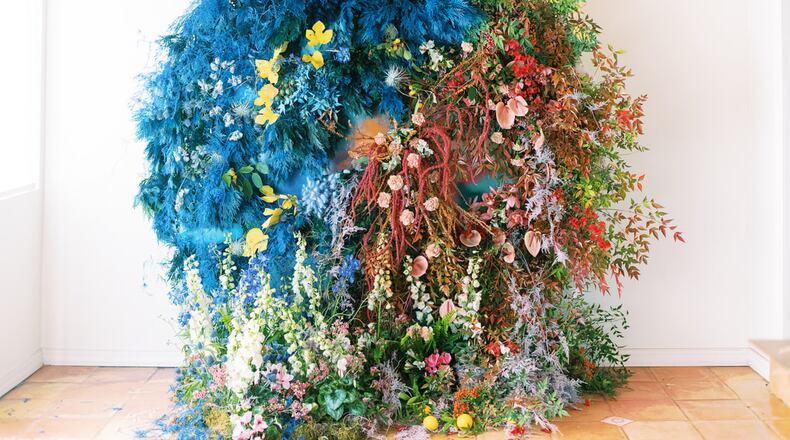Who would have thought the poppies would have outpaced the peas?
Whenever Whitney Jaye and her partner Brandon Stephens, co-owners of Sunbird Farms in Lithonia, sold flowers as well as vegetables they grew at farmers’ markets, they found the flowers would sell faster. Vegetable growers since 2017, they made the decision to convert their farm to flowers only at the start of the pandemic in 2020.
“It started off as an add on, you know? You grow vegetables and then you grow a little bit of flowers,” Jaye said. “Then I had a friend who was like, ‘Can you grow flowers for my wedding?’ So this little seed of interest kind of ballooned.”
Credit: Indie Film Lab
Credit: Indie Film Lab
Now Jaye is one of 22 Black flower growers, florists and floral event planners featured in the new book, “Black Flora,” by master gardener and author Teresa Speight. In an industry where Black florists have consistently had a presence but nonetheless have been overlooked by the mainstream, the book shines a light on contemporary growers and designers. In some ways it is a catalog of spectacular arrangements and gardens designed and cultivated by Black florists from coast to coast. But it is also a bit of a history lesson, subtly suggesting that from the days of antebellum gardens tended by the enslaved to Netflix floral design competition shows with Black contestants and judges, Black hands have always been present in floriculture. Even when they’ve been unseen.
This and other topics will be discussed during the Black Girl Florists conference March 25-27 at the Westin Peachtree Plaza in Atlanta.
“I spoke at the Slow Flowers Summit last summer, which is a conference for flower farmers,” said Abra Lee, former chief landscape manager for Hartsfield-Jackson International Airport. “This was in California and there’s 250 women there. There’s less than 10 Black women in the audience. My speech was on the history of Black florists. And Ashley Robinson, who’s in ‘Black Flora,’ came up to me and she was crying. She said she felt like the things she just knew instinctively were explained to her.
“I think we were all aware of our farming history,” Lee said, but not “the history of beautification and floriculture.”
Credit: Carlos Alejandro
Credit: Carlos Alejandro
Robinson who works in Los Angeles, isn’t a typical florist. She constructs jewelry, clothing and elaborate hair pieces, all temporary, but all from flowers. There’s a camouflage bomber jacket made of different shades and textures of moss. Individual chrysanthemum petals form a pendulum at the bottom of shoulder-grazing earrings.
Then there is the group, The Wild Mother, out of Oklahoma City, Oklahoma. They view their work with flowers as an extension of their politics. The three sisters had been operating their company for a few years, being careful not to overtly promote themselves as a Black business for fear non-Black customers wouldn’t patronize them if they found out. Then when Ahmaud Arbery, George Floyd and Breonna Taylor were killed, it made them rethink their choice.
So, last year on the centennial of the event, they created an elaborate performance memorial completely of arching towering flowers to honor those killed in the Tulsa Race Massacre of 1921. And now they proudly advertise that they are a Black-owned business.
Credit: The Wild Mother
Credit: The Wild Mother
“The fear this would cause a decrease in our business and (social media) followers is a scary thought, but I have made a conscientious decision that I don’t want to hide anymore,” Sacramento floral and event designer Gina Lett Shrewsberry is quoted in the book. “I’m standing on the shoulders of other African Americans who paved the way for me to be in this industry.”
Credit: Bloom Photography
Credit: Bloom Photography
Black Girl Florists Conference
March 25-27. $925. Registration closes at 11:59 p.m. March 18. The Westin Peachtree Plaza. 210 Peachtree St. NW. Atlanta. blackgirlflorists.com.
About the Author
Keep Reading
The Latest
Featured






